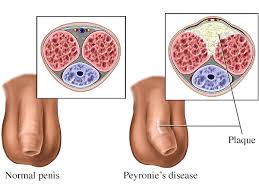 PD, also called chronic inflammation of tunica albuginea, curvature of the penis.
PD, also called chronic inflammation of tunica albuginea, curvature of the penis.
It is a connective tissue disorder involving the growth of fibrous plaques in the soft tissue of the penis.
Scar tissue forms in the tunica albuginea, the thick sheath of tissue surrounding the corpora cavernosa.
This causes pain, abnormal curvature, erectile dysfunction, indentation, loss of girth, and shortening of the penis.
Prevalence estimates varies widely from 0.3 to 20.3%.
In a study of men with diabetes, more than 20% I had Peyronie’s disease.
Its etiology is uncertain, but risk factors include penile trauma, all the rage, and diabetes.
Abnormal fibrosis reflects perturbations in wound healing, and aberrant deposition of extracellular matrix components.
Tunical mechanical stress and microvascular trauma are contributing factors.
Chromosomal abnormalities and single nucleotide polymorphisms may also be associated with a fibrotic diathesis.
There is overlap with superficial fibrosing disorders such as Dupuytren’s contraction, but not with systemic sclerosis.
Patient with Peyronie’s disease have an increased risk of all cancers, particularly stomach, testis, and melanoma.
It is more commonly middle-aged and older men compared to younger men.
It is associated with poorly controlled diabetes, suggesting a potential role of insulin resistance in disordered fibrosis.
Innumerable treatments have been proposed without documented efficacy.
Intralesional verapamil, interferon alpha, and collagenase are considered effective.
Surgical procedures including corporoplasty, plaque excision, penile prosthesis may be helpful.,
